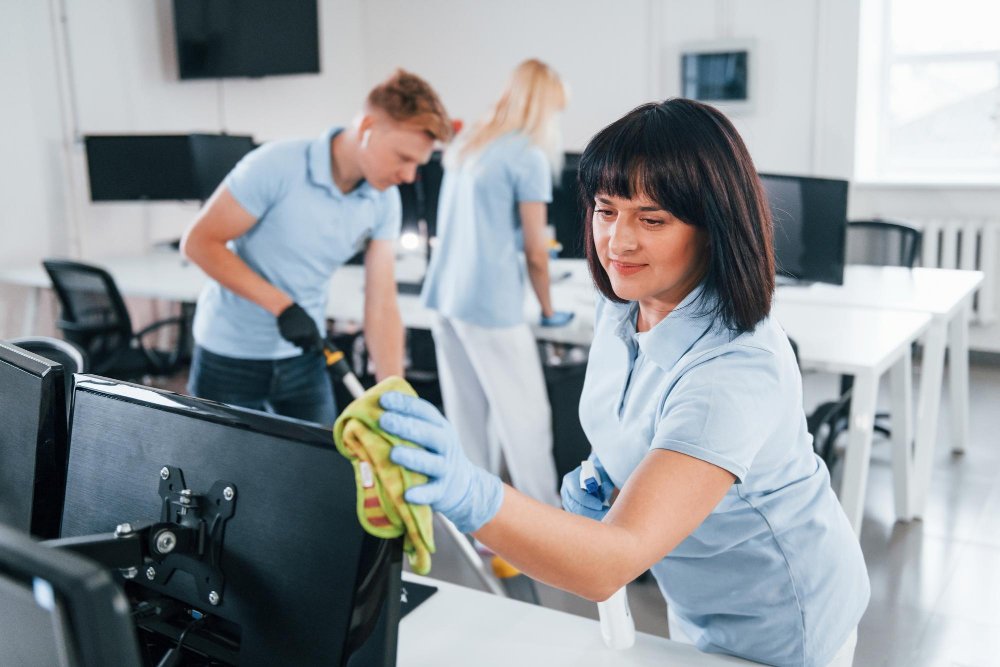When we think about who keeps our schools, offices, and public spaces running smoothly, we often forget a vital group: the cleaning staff. Yet, their role is essential.
Cleaning staff responsibilities go far beyond the visible—they directly impact health, safety, and operational excellence.
Why We Need to Talk About Cleaning Staff Responsibilities
In a world more aware than ever of health risks and environmental hygiene, the role of cleaning staff has shifted from overlooked to mission-critical.
Cleaning staff responsibilities go far beyond mopping floors or taking out the trash.
They include:
- Maintaining sanitized environments
- Monitoring supplies and reporting maintenance issues
- Supporting safety protocols
- Protecting public health in high-traffic areas
According to the CDC guidelines, proper facility hygiene directly reduces the spread of illnesses. That means your cleaning team is part of your risk management strategy.
What Do Cleaning Staff Actually Do?
Cleaning isn’t just a task—it’s a responsibility.
In modern facilities, cleaning staff responsibilities include:
- Disinfecting high-touch surfaces and restrooms
- Reporting safety or maintenance concerns
- Following strict hygiene protocols
- Managing supplies and protective equipment
- Supporting health policies, especially post-COVID
These professionals help prevent illness outbreaks and create a safe environment for students, employees, and visitors.
Who Are These Professionals?
They are not “just janitors.” They are:
- Custodians of public trust
- Leaders in cleanliness and organization
- Stewards of health and dignity in shared spaces
In facilities management, recognizing cleaning professionals as essential team members encourages retention, motivation, and better outcomes.
Where Are Cleaning Staff Responsibilities Most Critical?
Cleaning professionals are frontline defenders of wellness and safety across all types of buildings.
- Public and private schools
- Early childhood centers and daycares
- Office buildings and co-working spaces
- Churches, event venues, and gyms
- Commercial properties and housing complexes
No matter where you start, your effort makes the space feel safe and cared for.
What Kind of Facilities Are We Talking About?
Everywhere people walk in.
Here’s where cleaning staff make all the difference:
- Schools 🏫
From classrooms to cafeterias, they protect students’ health. - Corporate Offices 🏢
A clean desk equals focused productivity and employee morale. - Healthcare Clinics 🏥
Sanitation protocols here save lives. - Retail Spaces & Grocery Stores 🛒
Clean spaces build trust and increase customer retention.
Also read: How Data Intelligence Is Changing Preventive Maintenance in Schools
Cleaning Staff Responsibilities in Schools
They sanitize desks, maintain restrooms, handle waste, and ensure that students and teachers walk into a clean, healthy learning space every day.
Cleaning Responsibilities in Offices and Workplaces
From corporate towers to co-working hubs, cleaning staff manage conference rooms, shared kitchens, and restrooms—ensuring productivity isn’t disrupted by preventable issues.
Cleaning Staff in Healthcare and Clinics
Here, precision is life-saving. Cleaning staff follow strict disinfection procedures, especially in patient areas and treatment rooms.
Empowering Facility Teams to Lead
If you’re a cleaning professional or someone who hires them, here’s how you can elevate the role:
✅ Invest in training for surface disinfection and safety
✅ Provide clear protocols and task ownership
✅ Celebrate your team’s work publicly (like this post!)
👉 Want to grow from team member to team leader?
We’re building pathways for growth. Join us and lead the transformation of facility care.
Why Facilities Can’t Function Without Cleaning Teams
Facility managers, school directors, and business owners depend on the invisible work done every day. A classroom with dirty floors becomes unsafe. A neglected hallway can hide maintenance problems. And a clean environment leads to better behavior, health, and peace of mind.
Neglecting cleaning staff responsibilities means risking more than dirt—it risks dignity, safety, and trust.
Suggested Reading
Explore this related article:
👉 Like Snow on the Roof: The Risk of Overlooking Small Facility Problems
It connects perfectly with this theme and shows how small oversights turn into expensive repairs when cleaning and inspection routines are ignored.
Want to Join the Team or Recommend Someone?
Whether you’re applying for yourself or referring someone you trust, we’re always looking for great people to help us take better care of the spaces that matter.





